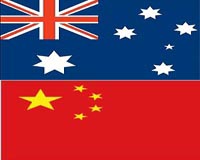| . |  |
. |
Santiago, Chile (UPI) Oct 30, 2009 Chile and Argentina have pledged to pursue full political integration and plan to drill new tunnels through the Andean mountains to bring the two countries physically closer together and ease free flow of their citizens. Chilean President Michelle Bachelet and Argentine President Cristina Fernandez de Kirchner Friday scheduled a unity summit, the highlight of which will be a bilateral treaty on integration and cooperation. Both sides spoke glowingly of integration, but there were no immediate details of how the integration will be worked out. Plans for drilling new tunnels through the Andean mountain range also depend on both sides being able to pool sufficient resources into the ambitious project. The circulated draft of the treaty provides for joint armed contingents to work in peacekeeping roles under U.N. supervision, free circulation of people in border areas and new tunnels under the Andes to facilitate transport. Chilean government economists are upbeat about the country's growth, but Argentina is struggling with endemic stoppages by farmers and workers angry over government policies. Buenos Aires was hit by a series of strikes Thursday as teachers, doctors and subway workers walked out over demands for higher wages and protests against budgetary cuts. The stoppages have hit Argentine exports, affected agricultural production and disrupted the country's rural infrastructure. The new integration and cooperation treaty discussed by the two presidents is designed to revive and update a peace and friendship treaty signed in 1984 but never vigorously implemented. Before that treaty, Chile and Argentina were in a tense and volatile relationship that raised concerns of an armed conflict. Both leaders expect to make political capital out of the new treaty, as it will presage the 2010 bicentennial celebration of their independence. The historic moment was marked by a joint military struggle against colonial Spain, led by Argentine Gen. Jose de San Martin and Chilean-born Bernardo O'Higgins, who are now revered as national heroes. Bachelet and Fernandez plan to sign the treaty in the county of Maipu, near Santiago, the scene of historic events in the war against Spain two centuries ago. Bachelet and Fernandez also plan to meet in the Vatican with Pope Benedict XVI to commemorate the Vatican's role in the mediation that averted a war between the two countries in a dispute over sovereignty in the Beagle Channel, the extreme south of the continent, MercoPress reported. That Vatican intervention set the stage for the peace and friendship treaty of 1984. However, through much of their history Chile and Argentina have disagreed over the definition of their shared border and sovereignty over three islands south of the Beagle Channel. The two countries also have competing claims on overlapping Antarctic territory. As the Antarctic becomes more navigable with melting ice, the region's significant wealth of resources has become a focus of attention. Argentine Foreign Affairs Minister Jorge Taiana said the treaty would be the first of its kind as it would be "a qualitative leap that shows how close and tight is the network of relations between the two countries." Share This Article With Planet Earth
Related Links Global Trade News
 China calls for new era with Australia after crisis
China calls for new era with Australia after crisisSydney (AFP) Oct 30, 2009 China on Friday called for a sweeping new era in ties with Australia including a free-trade deal, marking a dramatic turnaround in relations which reached crisis-point this year. Visiting vice premier Li Keqiang vowed to work for the long-awaited free-trade agreement and urged a "new level" in contacts beyond massive, multi-billion dollar iron ore and coal exports. "We should seize and l ... read more |
|
| The content herein, unless otherwise known to be public domain, are Copyright 1995-2009 - SpaceDaily. AFP and UPI Wire Stories are copyright Agence France-Presse and United Press International. ESA Portal Reports are copyright European Space Agency. All NASA sourced material is public domain. Additional copyrights may apply in whole or part to other bona fide parties. Advertising does not imply endorsement,agreement or approval of any opinions, statements or information provided by SpaceDaily on any Web page published or hosted by SpaceDaily. Privacy Statement |